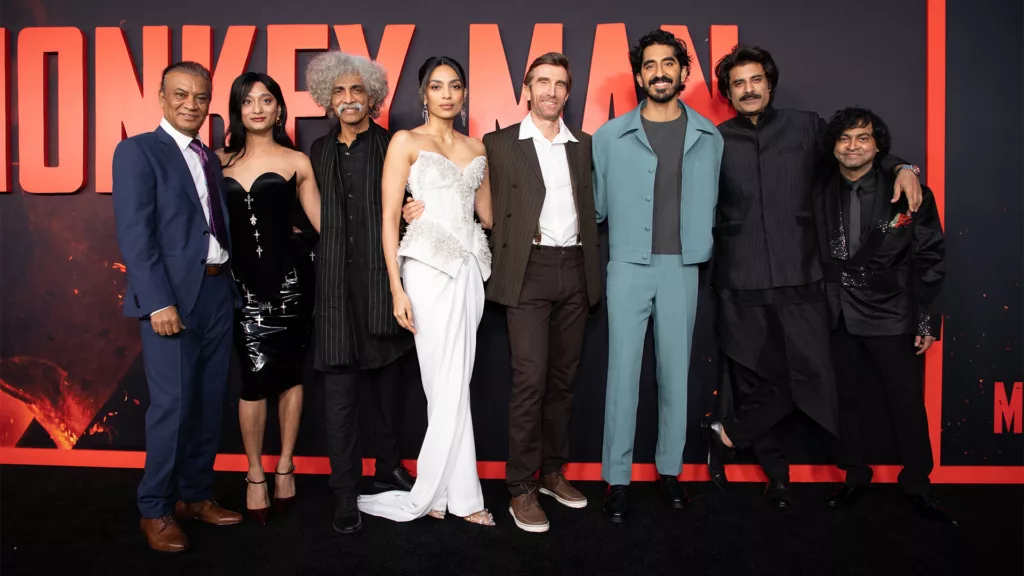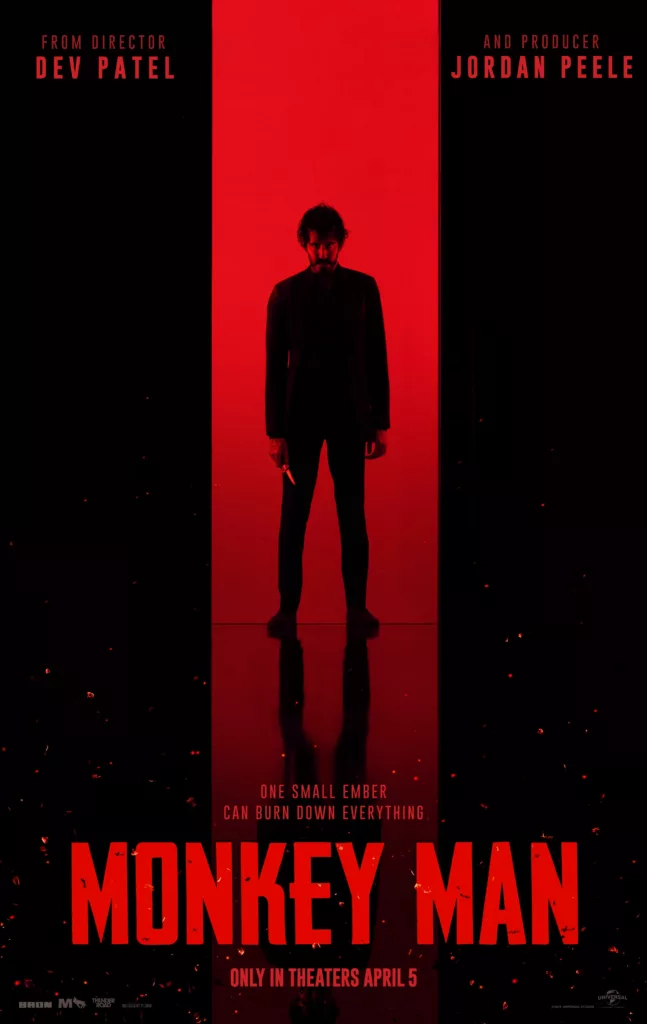First Impressions: “Monkey Man” Is a Modern Take on an Ancient Legend

Editor’s Note: This article contains spoilers for Monkey Man.
“Sometimes to break the mold you have to be in it,” Dev Patel exclaimed as he talked about his directorial debut film Monkey Man. This revelation comes years after a prior interview with Daily Mail where Patel acknowledged the struggles that Asian actors face in the entertainment industry and his hope that a change will come.
The idea for Monkey Man started developing after Patel spent time in Mumbai, India during the filming of Slumdog Millionaire. Throughout his career, Patel has talked about feeling disconnected from his Indian heritage and describes the trip to Mumbai as life-changing. While writing the script for Monkey Man, Patel was able to address all parts of himself, known and unknown. “I want[ed] to take all the ugly bits and the vibrant bits. It’s all in there. It’s the cocktail that makes me,” he stated in an interview.
The film references impactful Indian mythology, such as the legend of Hanuman and the Hindu epic Ramayana, to explore societal issues in India, including caste systems, police corruption, violence against women, and discrimination.
The Legend of Hanuman
The film’s protagonist, Kid (Dev Patel), draws many parallels with Hanuman, the half-monkey, half-God who represents wisdom, strength, courage, devotion, and self-discipline. In Hindu mythology, the young and mischievous Hanuman was forced to forget his powers until he matured and used them for the right reasons.
In the first half of the film, Kid resembles a young Hanuman. With the death of his mother still fresh in his mind, Kid seeks revenge while pulling his emotions from a place of rage. He has the strength to fight and the brains to infiltrate his way into the King Club, where the elites gather, but when he comes face-to-face with the enemy, he crumbles under the pressure.
Crashing back down to earth, similarly to Hanuman in the legend, Kid is forced to cope with his past trauma and learn the right way to avenge not only his mother, but others who suffer under the same continuous and corrupt cycle.
The Cast

Adding the role of casting director to his resume, Patel had a strong hand in crafting the best possible cast for his debut film. By observing his colleagues and sifting through India’s endless pool of talent, Patel found the perfect people to breathe life into the characters he created. For the majority of the cast, Monkey Man is their Hollywood debut.
Unconventional Heroes
Throughout the film, Kid gains help from unlikely places. After his failed attempt to take out his mother’s killer, he comes into contact with Alpha (Vipin Sharma), the keeper of the temple of Ardhanarishvara that houses members of the Hijra, the third-gender community of India. Once revered for their ability to bless people in contemporary times, many of the members of the Hijra community live in poverty and isolation. Finding solace in the home of the Hijra, Kid came to terms with his trauma and trained with a newfound mental and physical strength.
Caught In the Middle
Alphonso (Pitobash Tripati) is a middleman who walks the fine line between luxury and poverty. When he interacts with Kid (known to him as Bobby) in the kitchen of the King’s Club, he exhibits a carefree personality. But in the presence of the elites, Alphonso takes on a cowardly stance. Not fully belonging to a specific side, Alphonso places his allegiance wherever the most money is. Sita (Sobhita Dhulipala), another character caught in the middle, is a call girl whose experiences parallel those of Sita in the Ramayana. In the ancient legend, Sita is kidnapped by the demon King Ravana and is held in captivity. Displaying chastity, she spent her days and nights denying Ravana’s continuous romantic advances. In the film, Sita has no choice but to give herself up sexually as a means of survival. Kid’s presence in the elite club presents Sita with a glimmer of hope.
Nefarious Villains
Referencing the Ramayana further, each villain portrayed in Monkey Man represents one of the qualities of Ravana’s ten heads, including lust, greed, ego, and anger.
The first villain to be revealed is Tiger (Sharito Copley), a foreigner who exploits locals in an underground fight club. In one of his opening lines, Tiger says that although everyone present identifies with different religions, they all “worship one God, the Indian Rupee!” Showing further indifference to those around him, Tiger disregards the fighters’ native tongue as he barks orders at them in English. The police chief Rana (Sikandar Kher) is Kid’s main target, as he was the one who both murdered his mother and burned down his village. Parading around righteously during the day, Rana spends his nights indulging in lust as he interacts with Sita in the King’s Club. Baba Shakti (Makarand Deshpande), the final villain, is a wolf in sheep’s clothing. In the film, he is famously known as a spiritual guru who managed to weasel his way out of poverty. Using Rana as a scapegoat, he turns on the community he was once a part of to acquire land and wealth. Through further mass deception, he aims to get elected into office and gain an even higher seat in society. Finding out about Kid’s plan for revenge leaves him feeling threatened, and Baba Shakti plans to silence Kid before everything he worked for comes crashing down.

Monkey Man Meets Monkey Paw Productions
In March 2021, Monkey Man was acquired by Netflix for $30 million, but it was discreetly swept under the rug because the streaming platform had concerns about audience reception in India. After seeing the film for himself, filmmaker Jordan Peele acquired it under his production company Monkey Paw Productions and worked to get a theatrical release.
Displayed in the foreground of the Monkey Man movie poster is the tagline, “One small ember can burn down everything,” which fits right in with the theme of Monkey Paw Productions’ mission statement. The company’s main goal is to push boundaries visually, comment on ongoing social issues, and give a voice to underrepresented groups.
Now One For the Underdogs
Monkey Man successfully translates an ancient story into a modern-day tale. From its fast-paced action sequences to its comprehensive soundtrack, Monkey Man provides a stimulating experience for all viewers — you do not need to be well-versed in Indian culture to fully understand and enjoy the film.
In the development of the film the budding director aimed to address an all-embracing feeling. “I think we’re all underdogs of our own story. I think it’s a truly universal feeling. There’s many in my story, it just so happens that these underdogs band together.” Patel stated. Filled to the brim with various themes, Monkey Man breathes new life into the film industry and opens the floor for discussion on an extensive list of topics.
Need another movie to add to your watchlist? Check out this piece about Daniel Kaluuya’s directorial debut here!



